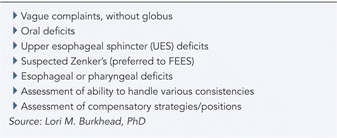Often, further evaluation is necessary. Several well-established modalities are available, including transnasal esophageoscopy (TNE); videofluorographic swallowing study (VFSS) or, as it is commonly called, modified barium swallow study (MBSS); and flexible endoscopic evaluation of swallowing (FEES) alone or with the addition of a sensory test (FEESST). Real-time MRI is also being looked at for use in this setting, but to date it remains investigational.
Explore This Issue
February 2009Among these, the most commonly used are the MBSS and FEES exams. A great deal of data and literature is available on the relative merits of each, and a discussion of which exam may be better is still under way, but, to date, data suggest that both are useful tools and in some cases complementary to each other. According to Dr. Burkhead, although past thinking tended to view one exam as better than the other, current opinion tends to see each tool as providing unique information. The choice of exam, therefore, depends largely on the clinical questions to be answered and the presentation of the patient. When both pharyngoesophageal and oropharyngeal symptoms are reported, or when one exam does not answer all the clinical questions, she recommends using both tests.
Modified Barium Swallow Study (MBSS)
Also referred to as VFSS, MBS, rehab swallow study, or cookie swallowexam, the MBSS is a radiologic test done commonly by a speech-language pathologist and radiologist to evaluate esophageal function, and is particularly helpful in looking for motility disorders. Patients swallow a small amount of barium mixed with real food and liquids, which permits assessing all phases of swallowing from when the food enters the mouth until it moves into the stomach.
This test is commonly used by otolaryngologists when an upper aerodigestive tract problem is suspected, said Christine Gourin, MD, Associate Professor in the Department of Otolaryngology-Head and Neck Surgery at Johns Hopkins University in Baltimore, adding that an important aspect of the test is that it can be stopped if the patient starts to aspirate. She cautioned against using this test in patients with gross aspiration.
Overall, she said, the test is superior for evaluating muscular function. MBSS really helps pinpoint which pharyngeal muscles or parts of the tongue are not working, she said. In addition, MBSS identifies trace amounts of aspiration of thin liquids and can identify strictures in the upper esophagus, both of which can be missed using FEES.

Leave a Reply